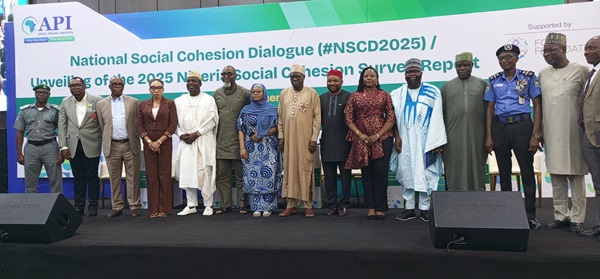
The 2025 edition of the National Social Cohesion Dialogue (#NSCD2025) held in Abuja served as a clarion call for national renewal, unity, and civic engagement. Convened under the theme “Rebuilding Citizens’ Trust and Public Confidence in Government and Public Institutions,” the event brought together political leaders, civic advocates, academics and concerned citizens to reflect on the widening trust deficit and rising disaffection across Nigerian society.
The high-level dialogue featured the unveiling of the 2025 Nigeria Social Cohesion Survey Report by the Africa Polling Institute (API), revealing stark insights into how economic hardship and institutional distrust are uniting citizens across identity lines.
The survey found that 83 per cent of Nigerians lack trust in the federal government, 80 per cent distrust the National Assembly, and 79 per cent have little or no confidence in the judiciary. Despite identity-based differences, the report indicated that Nigerians are united by shared grievances such as inflation, unemployment, and insecurity.
Executive director of API, Prof. Bell Ihua said the data underscores the urgency for government and public institutions to re-engage meaningfully with citizens. “There is an overwhelming call for a renewed social contract that clearly defines responsibilities and deliverables between citizens and government,” he said.
The event also featured strong advocacy for people-centered policies and inclusive governance. Recommendations included implementing community-driven reforms, rebuilding public accountability, and investing in policies that protect lives, reduce poverty and restore dignity to citizens.
Speakers repeatedly emphasized that social cohesion is not only a political or economic issue but a moral imperative. Director of the Abuja School of Social and Political Thought, Dr. Sam Amadi called for moral leadership and deeper civic participation to counter rising despair. “Nigeria’s crisis is one of moral collapse,” he said. “People no longer believe government exists to serve them. Even good policies fail in such an environment.”
The dialogue also spotlighted the growing disconnect between elites and the broader public. Former Ekiti State governor, Dr. Kayode Fayemi, represented by Mallam Ahmed Sajo, observed that Nigeria is in danger of losing its shared humanity due to widening inequality and lack of inclusive governance. He emphasized the need for an elite consensus and a return to values-driven leadership.
Participants stressed that rebuilding trust must go beyond mere rhetoric to include tangible reforms across sectors. Discussions explored the role of civic education, institutional accountability and grassroots engagement in strengthening Nigeria’s democratic foundations.
The #NSCD2025 event attracted over a hundred participants, including student unions, traditional rulers, civil society leaders, and diaspora partners. In various breakout sessions, participants explored how communities could build resilience through interfaith dialogue, youth empowerment, and participatory governance.
Former Rivers State governor, Hon. Rotimi Amaechi in his address, urged Nigerians to stop outsourcing responsibility to political leaders. “The elite know the problems,” he said. “But unless the people act, change will not happen.” He advocated for stronger civic engagement and economic empowerment as tools to rebuild trust and reduce insecurity.
The event concluded with a call to action: reimagine citizenship, amplify community voices, and foster inclusive development models that prioritise dignity and justice. Organizers expressed optimism that the cohesion survey and dialogue outcomes will inform policy and ignite collaborative efforts to strengthen national unity.
As Nigeria grapples with complex social, political and economic crises, #NSCD2025 reaffirmed that genuine transformation must begin from the ground up – with citizens, communities and a shared commitment to rebuilding the social fabric.

